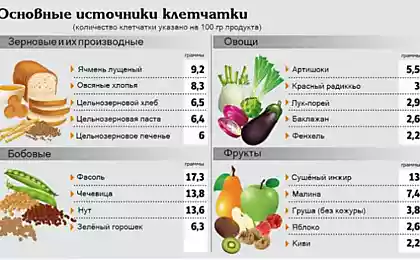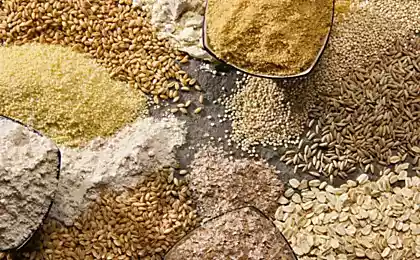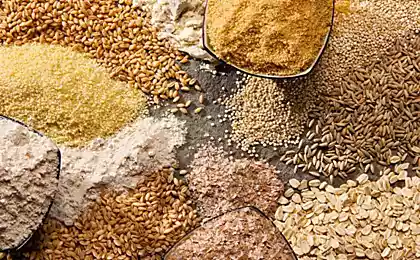534
Foods help to curb appetite and maintain a sense of satiety for a long time
You do snack between meals, because too hungry to wait. Eat more than you need, because I just don't feel satiety. It is familiar to everyone. The feeling of fullness after or between meals – that will help keep normal weight. According to recent studies, 74% of consumers believe that could successfully get rid of excess weight, if only he could control the feeling of hunger. Also 87% of consumers define satiety as an important criterion in the choice of products.

Many nutrients and natural products can help curb your appetite and maintain a sense of satiety for a long time.
Protein
To date, protein is one of the most important nutrients, in particular due to its influence on the feeling of satiety. Some researchers believe that Breakfast (especially rich in protein) will help to reduce food cravings and improve the quality of the food suffering from overweight or obese teenage girls. In a randomized cross-over study involved 20 girls, who for six days were consumed for Breakfast of 350 kcal (13 g of protein) in the form of products, corn-based, 350 kcal a products with high protein content of eggs and meat (35 g protein) either did not have Breakfast. The presence in the diet of the Breakfast led to a positive change in the excitation of appetite, hormonal, and neural signals that control food intake. Consumption of high-protein Breakfast led to further alterations in these signals and reduce the number of evening snacking compared to those who did not had Breakfast.
Fourteen studies were devoted to the study of satiety of dairy products, including casein, yogurt, skim milk, milk protein and milk chocolate. The goal is to compare the effect on appetite of Breakfast with high (25% energy) and normal (10% energy) containing casein, soy or whey-protein breakfasts, the impact on certain hormones, the reaction of amino acids and subsequent energy consumption. Ten percent whey protein reduces hunger more effectively than casein or soy protein, and 25% causes a stronger reaction of hormones.
Whey protein is a naturally complete protein containing all the essential amino acids to the body, is also one of the best sources of branched chain amino acids, especially leucine. Leucine increases the amount of muscle protein. Whey protein can help to achieve feelings of satiety by stimulating several gastrointestinal hormones that are responsible for appetite control in the brain.
The afternoon high-protein snack containing soy lead to improved appetite control and reduced unhealthy evening snacking in young people. A study was conducted with the participation of thirty-two healthy adolescents, within three days consuming an afternoon snack (260 calories) with high protein content (26 g protein, 6 g fat, 27 g of carbohydrates), high in fat (4 g protein, 12 g fat, 32 g carbohydrate) and do not snack at all. Although both snacks reduce hunger, food cravings and increase following food intake, and also increase the feeling of satiety, when compared with the complete lack of snacking, consumption of high-protein snacks leads to a more significant reduction in feelings of hunger compared with snacking of foods with a high fat content. Only snacks with high protein content helped to delay the next meal.
Whole grains and fiber
Some studies found a relationship between certain whole grains and satiety.
According to recent studies, lovers of whole grain rye bread felt a decrease in hunger, accelerated uptake and did not experience strong cravings in contrast to those who prefer processed white bread. Consumption of whole grain barley products with high fiber content also significantly reduces the feeling of hunger, while products made from whole wheat and processed rice – no.
Dietary fiber is also associated with the feeling of satiety. In one study twenty-six healthy men an hour before dinner drink 400 g fruit smoothie containing 12 g (3%) Polydextrose. The effect of the cocktail with the contents of Polydextrose were compared with the effect of the control of the cocktail without the specified fiber. Consumption of the first cocktail has led to a significant reduction in energy requirements for lunch – less than 102 kcal compared to benchmarks.
Eggs
Research whole foods consistently indicate that protein is a macronutrient with the most satiating ability: for this indicator, it is superior to carbs and fats. The concept of saturation is new to most consumers and difficult to understand. Some studies have shown that a Breakfast of eggs with a high content of proteins gives the body a greater feeling of satiety than high carbohydrate Breakfast pastries.
In addition, the Breakfast based on the eggs, reduces the number of small snacks – which is not true when consumed isocaloric Breakfast.
Researchers believe that a protein-rich Breakfast can reduce the number of snacks with a high fat content during the day. The author expresses the view that the level of satiation may influence the quality of the protein. Breakfast of eggs gives more satiety than low-quality protein Breakfast of wheat-based.
Almonds
The researchers found that those who ate 1.5 oz of roasted and lightly salted almonds every day experienced a decrease in hunger and also enrich your diet with vitamin E and monounsaturated fats without increasing weight. In a four-week randomized controlled clinical trials, under the leadership of scientists, involved 137 people with an increased risk of developing type 2 diabetes. The subjects were divided into five groups: a control group that did not eat nuts, and seeds; two groups who ate 1.5 oz of almonds every day for Breakfast or lunch, respectively; the two groups, for which the almonds were served as morning or afternoon snack of 1.5 ounces of almonds between regular meals.
Effect of almonds on satiety may be associated with monounsaturated fats (13 g/oz), protein (6 grams/ounce) and fiber (4 g/oz), contained in the almond, however, for more precise conclusions, further studies are needed.
Beans
The legume family includes peas, beans, lentils, Turkish walnut. For legumes are characterized by high content of protein and fiber and low in fat. Studies have shown that legumes contribute to the rapid saturation, but do not alienate the next meal.
6. Saffron extract
Many people are satisfied with snack and overeat due to stress, anxiety, some kind of dissatisfaction or just out of habit – they "seize" issue. This approach is fundamentally different from the rest – satiety through a sense of well-being. Saffron extract is a patented extract of saffron stigmas, which positively influences satiety, appetite, mood and behaviors associated with snacking.
This product has a unique mechanism of action, through which not only gives the person a feeling of satiety but helps avoid snacking and compulsive cravings, which in turn leads to weight loss. The extract works through the neurotransmitters serotonin, helping to generate a sense of satiety.
Its validity was tested in two randomized, double-blind, placebo-controlled clinical studies: four-week and eight-week pilot double-blind placebo-controlled study.
In 2010, the study involved 60 healthy, but with a small overweight of women aged 25-45 years. The consumption of saffron extract for 8 weeks resulted in significantly greater weight loss than in the group where women took a placebo. In the first group the number of snacking decreased by 55% and in the placebo group – at 28%. Also decreased appetite 69% and 54%, respectively.
Korean pine nut
Natural oil extracted from the nuts of the Korean pine (cedar), helping to curb the appetite and promotes feeling of satiety. Korean pine nuts are especially rich in such long-chain fatty acids like pinaeva acid – and here is its content in 40 more than in other species of pine nuts.
30-60 minutes after the consumption of 3 grams of these nuts, in the blood of subjects experienced substantially increased release of the satiety hormone cholecystokinin. Also significantly increased the release of blood and other satiety hormone, glukagonovy peptide-1 (GLP-1). Both hormones send signals of satiation to the brain and play an important role in the regulation of food intake.
Source: mixednews.ru/archives/69702

Many nutrients and natural products can help curb your appetite and maintain a sense of satiety for a long time.
Protein
To date, protein is one of the most important nutrients, in particular due to its influence on the feeling of satiety. Some researchers believe that Breakfast (especially rich in protein) will help to reduce food cravings and improve the quality of the food suffering from overweight or obese teenage girls. In a randomized cross-over study involved 20 girls, who for six days were consumed for Breakfast of 350 kcal (13 g of protein) in the form of products, corn-based, 350 kcal a products with high protein content of eggs and meat (35 g protein) either did not have Breakfast. The presence in the diet of the Breakfast led to a positive change in the excitation of appetite, hormonal, and neural signals that control food intake. Consumption of high-protein Breakfast led to further alterations in these signals and reduce the number of evening snacking compared to those who did not had Breakfast.
Fourteen studies were devoted to the study of satiety of dairy products, including casein, yogurt, skim milk, milk protein and milk chocolate. The goal is to compare the effect on appetite of Breakfast with high (25% energy) and normal (10% energy) containing casein, soy or whey-protein breakfasts, the impact on certain hormones, the reaction of amino acids and subsequent energy consumption. Ten percent whey protein reduces hunger more effectively than casein or soy protein, and 25% causes a stronger reaction of hormones.
Whey protein is a naturally complete protein containing all the essential amino acids to the body, is also one of the best sources of branched chain amino acids, especially leucine. Leucine increases the amount of muscle protein. Whey protein can help to achieve feelings of satiety by stimulating several gastrointestinal hormones that are responsible for appetite control in the brain.
The afternoon high-protein snack containing soy lead to improved appetite control and reduced unhealthy evening snacking in young people. A study was conducted with the participation of thirty-two healthy adolescents, within three days consuming an afternoon snack (260 calories) with high protein content (26 g protein, 6 g fat, 27 g of carbohydrates), high in fat (4 g protein, 12 g fat, 32 g carbohydrate) and do not snack at all. Although both snacks reduce hunger, food cravings and increase following food intake, and also increase the feeling of satiety, when compared with the complete lack of snacking, consumption of high-protein snacks leads to a more significant reduction in feelings of hunger compared with snacking of foods with a high fat content. Only snacks with high protein content helped to delay the next meal.
Whole grains and fiber
Some studies found a relationship between certain whole grains and satiety.
According to recent studies, lovers of whole grain rye bread felt a decrease in hunger, accelerated uptake and did not experience strong cravings in contrast to those who prefer processed white bread. Consumption of whole grain barley products with high fiber content also significantly reduces the feeling of hunger, while products made from whole wheat and processed rice – no.
Dietary fiber is also associated with the feeling of satiety. In one study twenty-six healthy men an hour before dinner drink 400 g fruit smoothie containing 12 g (3%) Polydextrose. The effect of the cocktail with the contents of Polydextrose were compared with the effect of the control of the cocktail without the specified fiber. Consumption of the first cocktail has led to a significant reduction in energy requirements for lunch – less than 102 kcal compared to benchmarks.
Eggs
Research whole foods consistently indicate that protein is a macronutrient with the most satiating ability: for this indicator, it is superior to carbs and fats. The concept of saturation is new to most consumers and difficult to understand. Some studies have shown that a Breakfast of eggs with a high content of proteins gives the body a greater feeling of satiety than high carbohydrate Breakfast pastries.
In addition, the Breakfast based on the eggs, reduces the number of small snacks – which is not true when consumed isocaloric Breakfast.
Researchers believe that a protein-rich Breakfast can reduce the number of snacks with a high fat content during the day. The author expresses the view that the level of satiation may influence the quality of the protein. Breakfast of eggs gives more satiety than low-quality protein Breakfast of wheat-based.
Almonds
The researchers found that those who ate 1.5 oz of roasted and lightly salted almonds every day experienced a decrease in hunger and also enrich your diet with vitamin E and monounsaturated fats without increasing weight. In a four-week randomized controlled clinical trials, under the leadership of scientists, involved 137 people with an increased risk of developing type 2 diabetes. The subjects were divided into five groups: a control group that did not eat nuts, and seeds; two groups who ate 1.5 oz of almonds every day for Breakfast or lunch, respectively; the two groups, for which the almonds were served as morning or afternoon snack of 1.5 ounces of almonds between regular meals.
Effect of almonds on satiety may be associated with monounsaturated fats (13 g/oz), protein (6 grams/ounce) and fiber (4 g/oz), contained in the almond, however, for more precise conclusions, further studies are needed.
Beans
The legume family includes peas, beans, lentils, Turkish walnut. For legumes are characterized by high content of protein and fiber and low in fat. Studies have shown that legumes contribute to the rapid saturation, but do not alienate the next meal.
6. Saffron extract
Many people are satisfied with snack and overeat due to stress, anxiety, some kind of dissatisfaction or just out of habit – they "seize" issue. This approach is fundamentally different from the rest – satiety through a sense of well-being. Saffron extract is a patented extract of saffron stigmas, which positively influences satiety, appetite, mood and behaviors associated with snacking.
This product has a unique mechanism of action, through which not only gives the person a feeling of satiety but helps avoid snacking and compulsive cravings, which in turn leads to weight loss. The extract works through the neurotransmitters serotonin, helping to generate a sense of satiety.
Its validity was tested in two randomized, double-blind, placebo-controlled clinical studies: four-week and eight-week pilot double-blind placebo-controlled study.
In 2010, the study involved 60 healthy, but with a small overweight of women aged 25-45 years. The consumption of saffron extract for 8 weeks resulted in significantly greater weight loss than in the group where women took a placebo. In the first group the number of snacking decreased by 55% and in the placebo group – at 28%. Also decreased appetite 69% and 54%, respectively.
Korean pine nut
Natural oil extracted from the nuts of the Korean pine (cedar), helping to curb the appetite and promotes feeling of satiety. Korean pine nuts are especially rich in such long-chain fatty acids like pinaeva acid – and here is its content in 40 more than in other species of pine nuts.
30-60 minutes after the consumption of 3 grams of these nuts, in the blood of subjects experienced substantially increased release of the satiety hormone cholecystokinin. Also significantly increased the release of blood and other satiety hormone, glukagonovy peptide-1 (GLP-1). Both hormones send signals of satiation to the brain and play an important role in the regulation of food intake.
Source: mixednews.ru/archives/69702






















